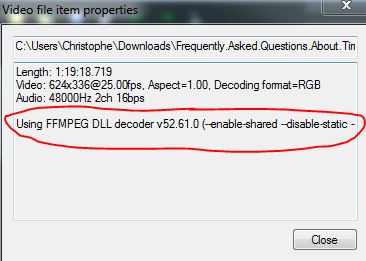Video Support
From CockosWiki
Christophe (Talk | contribs) |
Christophe (Talk | contribs) |
||
| Line 3: | Line 3: | ||
=Video support in REAPER= | =Video support in REAPER= | ||
| - | REAPER supports video | + | REAPER supports inserting video items in your project. By default, each architecture uses a different playback system: |
* Windows: Video playback is provided by DirectShow | * Windows: Video playback is provided by DirectShow | ||
Revision as of 21:36, 22 May 2010
Main Page > REAPER Documentation, going quite a lot further
Contents |
Video support in REAPER
REAPER supports inserting video items in your project. By default, each architecture uses a different playback system:
- Windows: Video playback is provided by DirectShow
- Mac OSX: Video playback is provided by QuickTime
This could be overridden by using the advanced FFmpeg support described below.
Rendering video
Starting with v3.52, REAPER supports loading and rendering into AVI and MKV (Matroska) files. The supported codecs are DV, FFV1 (lossless) and Huffyuv (lossless).
If the FFmpeg libraries are installed, a lot more video rendering formats will be available.
Improved video support
Starting with v3.45, REAPER supports decoding and encoding video files using FFmpeg. FFmpeg provides faster video decoding and is usually more supported than the default DirectShow and QuicktTime architectures.
To install the improved video support, you'll need to obtain the FFmpeg libraries. These could be found at the following websites:
- http://aegiscorp.free.fr/ffmpeg/ - Provides FFmpeg libraries for Windows x32, x64 and Mac OSX
- http://ffmpeg.arrozcru.org/builds/ - Provides daily automated FFmpeg libraries for Windows x32 and x64
You'll need to install the library files in the following folder:
- Windows: REAPER's program file folder (usually C:\Program Files\REAPER). The needed files are:
- avcodec-52.dll
- avformat-52.dll
- avutil-50.dll
- swscale-0.dll
- Mac OSX: <inidir>/UserPlugins (usually <home folder>/Library/REAPER/UserPlugins)
- Alternatively, you can compile your own version of FFmpeg and have it installed in /usr/local/lib. REAPER will first look in the UserPlugins folder, then in the local library folders.
You can check which video decoding system is used when right-clicking on a media item in REAPER:
More information
- REAPER uses code of FFmpeg licensed under the LGPLv2.1 and its source can be downloaded at http://reaper.fm/lgpl/

